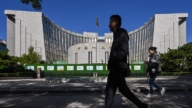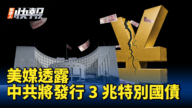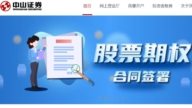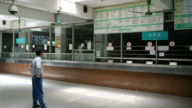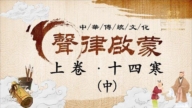【新唐人2013年12月23日讯】近几天,中国银行间资金面再度上演风云突变,关键期限资金利率创六月份钱荒以来新高,开始中共央行坚持不公开放水,再度的钱荒导致市场一度恐慌,迫使央行不得不采取紧急救市措施,向亟需资金的银行提供信贷。外界认为,尽管中共总理李克强想让中国经济走向正轨,然而失血过多的中共金融体系,以及金融崩溃可能引发的全面危机,迫使当局不得不再度介入。专家指出,钱荒的反复出现,体现出了中国经济的真实情况。
从12月17号开始,中共银行间线上资金利率就开始出现跳跃性上涨,18号,银行间利率再度上升,线上资金利率终于向线下看齐,银行间7天质押式回购加权平均利率,收涨152个基点于6.3772%,盘中最高成交利率更是高达7.5%,创下今年6月25号钱荒以来的新高。19号早些时候,货币市场利率再次飙升,中国短期流动性的关键指标——7天期质押式回购利率——升到近10%。
这次流动性骤紧与11月中下旬时的一轮紧张行情如出一辙。11月15号,线上7天资金利率单日飙升117个基点,而这次7天资金利率飙升152个基点也仅在一个交易日内完成。
大陆金融投资顾问郑志遥:“这就是真实的东西,报表啊,造假都掩盖不住的问题,这才是真相。”
不过直到19号早些时候,7天期质押式回购利率升到近10%,央行继续在公开市场维持零操作,坚持不公开放水。稍后,中共人民银行公开声称,它已通过“短期流动性调节工具”(SLO),向亟需资金的银行提供了信贷。
中华经济研究院教授吴惠林:“这证明中国的金融(问题)非常的严重,不只是地方债还有企业债的问题,这些问题都隐藏在后面,全面银行崩溃的话,问题就非常严重,万箭齐发的话,那就很惨。”
郑志遥:“银行体系是我们政府的命根子,戳出来大的窟窿,或暴露出大的问题,都是最后央妈来买单,所以央妈必须要大家过紧日子,要真是过不下去了,那还是要拉一把,不管你的话麻烦很大。”
不过央行的这次操作不同寻常。根据央行自己的规则,它应当在实施SLO操作的一个月后才予以宣布,但这一次没有迟延。下午央行利用新浪微博官网,告诉市场:它已向相关银行提供了紧急资金。
央行还将中国银行间市场交易延长了30分钟,让金融机构有更多时间获得资金。央行上一次延长交易时间是在6月“钱荒”期间。
吴惠林:“说明这个事情非常紧急,原来就发生钱荒了,现在美国的QE又要退场,大家预期资金又要流回美国的时候,就雪上加霜,央行就祭出一些手段,稳住人们的心理,不然原来这个失血的这钱荒只会更加严重,那你说是要短痛还是长期的痛。”
中共国务院总理李克强上任以来,一直强调深化金融改革,曾经强调央行不再像以前那样放水救市,不过6月钱荒和11月钱荒出现时,央行还是照旧放水。
央行表示,如果有必要的话,央行以后还会根据财政支出进度情况,继续向符合条件金融机构,通过SLO提供流动性支持。
郑志遥:“特殊情况下的应急预案,让大家都好好的,但是从根本上还要靠你自己来解决,只能是治标,不能用救火的方式来当作我们的常态。”
大陆金融投资顾问郑志遥一再强调,市场规律是无情,政府干预太多,自会受到市场规律的惩罚。郑志遥说,股票是经济的晴雨表,股票指数在12月大多数时候持续下跌,沪深300指数在过去11个交易日下跌5.5%。
19号,“美联储”宣布明年初退出代表货币量化宽松政策的QE。中华经济研究院教授吴惠林指出,这会导致更多的热钱流回美国,中国的经济将面临更严峻的考验。
采访编辑/刘惠 后制/孙宁
Numbers Don’t Lie: Bank Runs Force China’s Central Bank to Intervene
China’s inter-bank funding has again been in turmoil.
The key term funding rates reached a record high.
At first, the Central Bank did not loosen
its policies until there was a bank run.
Subsequently, the Central Bank had to take emergency
action, to give loans to banks that needed it most.
Premier Li Keqiang has prioritized China’s economy.
However, this already ailing economy
is facing a full-blown bankruptcy crisis.
The Central Bank has again intervened in the market.
Experts point out that the repetition of bank runs
demonstrates the realities of China’s economy.
Since December 17, the inter-bank online
fund rates have been escalating in China.
On December 18, the inter-bank rate shot up again,
and the online fund rates are emulating offline rates.
The inter-bank 7 day repurchase weighted average
interest rate increased 152 basis points, reaching 6.3772%.
The highest quoted bid was a
record high since June 25, at 7.5%.
Early on December 19, the money market rate soared again.
The key indicator of short-term liquidity, the inter-bank 7 day
repurchase weighted average interest rate was almost 10%.
The liquidity squeeze is no different
from that in mid to late November.
On November 15, the inter-bank 7 day repurchase weighted
average interest rate increased by 117 basis points.
Whereas, this time it shot up 152
basis points within one trading day.
Zheng Zhiyao, Financial Investment Advisor
in China: “This is the truth that financial reports
or bogus data can’t conceal. It is the real truth.”
Up until early December 19, the inter-bank 7 days repurchase
weighted average interest rate rose to almost 10%.
Nevertheless, the Central Bank didn’t take action
in the public market, in order to lower the rates.
The People’s Bank of China then made a public declaration.
It has loaned to the banks that need cash
most via short-term liquidity operations.
Wu Huilin, Professor, Chung-Hua Institution for
Economic Research, “It proves there are tremendous
and serious problems in China’s financial market.
Those problems are not only around municipals or corporate
bonds. Actually, the real problem is hiding behind the scenes.
If banks in China go bankrupt altogether, it’ll be disastrous.”
Zheng Zhiyao: “The banking system
is the lifeblood of a government.
If there are any holes or problems in that system,
the central bank would have to pay the price.
The central bank is asking its people to lead a thrifty life now.
Even if it knows it’s really hard to pull through,
it’ll still want to struggle a little bit longer.
Otherwise, the consequences will be severe.”
However, it is deemed very unusual for a central bank
to notify the public about its operations immediately.
According to its own rules, the central bank can
only announce it one month after the SLO operation.
On the afternoon of December 19, the Central Bank
posted on its sina official blog that it has already
loaned to those banks that need cash urgently.
The Central Banks also prolonged the
inter-bank market trading time by 30 minutes.
This was meant to enable the financial
structures to have enough time to obtain funds.
The last time this happened was June this year, when the
Central Bank had to prolong trading times during a bank run.
Wu Huilin: “The immediate announcement from
the Central Banks indicates a case of emergency.
A bank run has taken place before.
Now, the United States is exiting
from ‘ Quantitative Easing’ (QE) policy.
When people expect more capital will flow
back into the States, it makes it even worse.
That’s why the Central Bank played
some tricks to calm people’s minds.
Otherwise, the situation of bank runs can only become
worse. It’s only a question of long-term or short-term pain.”。
Since Premier Li Keqiang took office, he
has been promoting financial reforms.
He has emphasized that the Central Bank shouldn’t save
the market by loosening policies, as it has done in the past.
However, when bank runs took place in June and
November, the Central Bank still played these old tricks.
The Central Bank claimed that it will continue providing help
to qualified financial structures via SLO if it’s necessary.
This flexibility will be based on its fiscal expenditure schedule.
Zheng Zhiyao: “In special situations, the Central Bank
can solve some problems with contingent plans.
However, the root problems have to be solved.
It can’t work on trying to put out fires every day.”
Zheng Zhiyao repeatedly stressed that
the financial market principles are merciless.
If the government intervenes too much,
it’ll get punished by the market principles.
Zheng Zhiyao said that the stock market
performance is the barometer of an economy.
In December, stock indices keep decreasing. Hushen 300
Index has decreased by 5.5% within the past 11 trading days.
On December 19, the US “Federal Reserve” announced
it will exit from the QE (Quantitative Easing) monetary policy.
This will cause a lot more cash to flow back into the States.
Thus, the economy in China will face more severe challenges.
Interview & Edit/LiuHui Post-Production/SunNing


